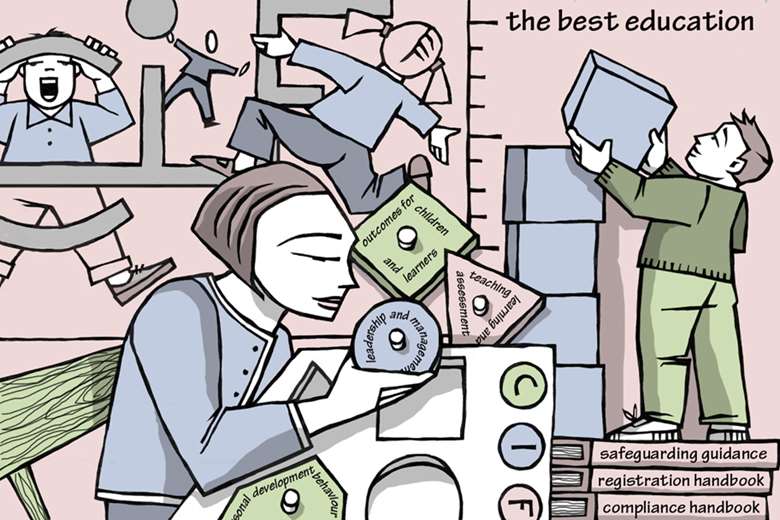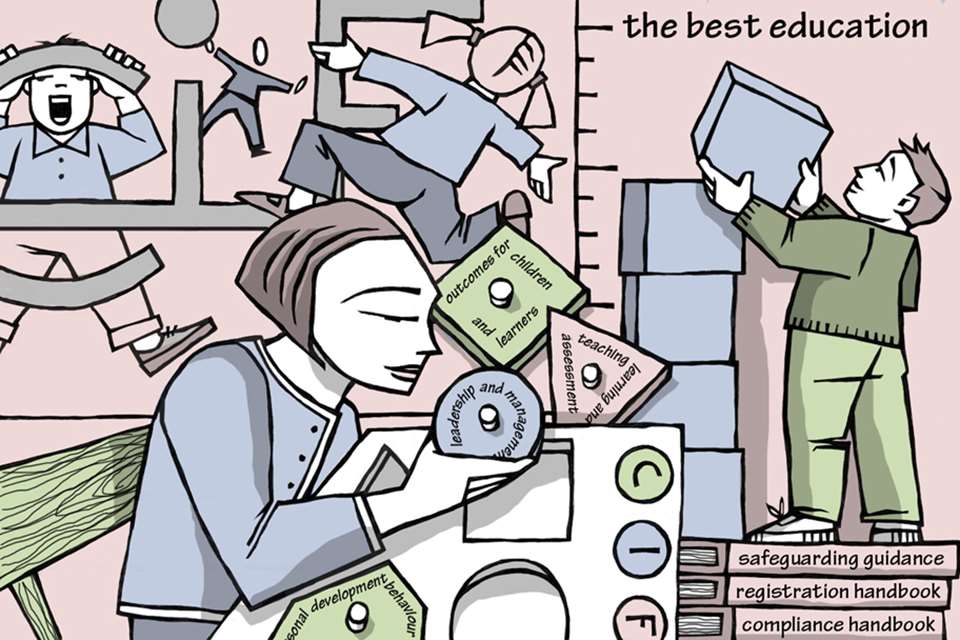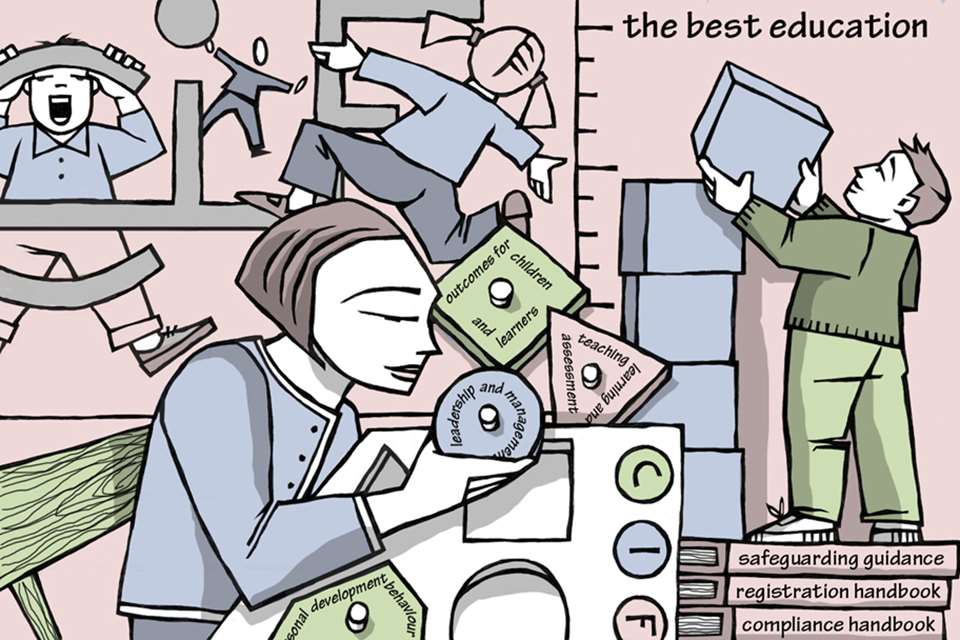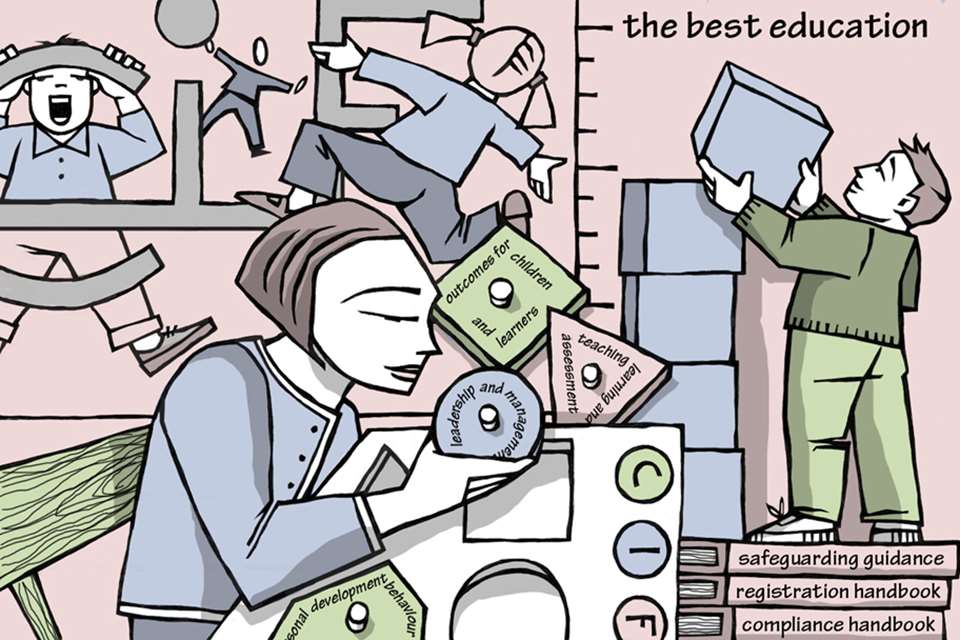Common Inspection Framework: Part 5 - Under the Spotlight
Monday, November 16, 2015
What does inspection actually feel like under Ofsted’s new framework? Hannah Crown speaks to three nurseries for their thoughts on the key changes in emphasis

Initial phone conversation and conduct
Since no-notice inspections were abandoned for private, voluntary and independent settings, inspection is announced by telephone around midday on the working day before the inspection is to take place. Kelly Russell, owner of Footsteps Childcare Centre in Cornwall, says the inspector sent a list of 15 documents she would want to see, such as staff qualifications, DBS forms and records of complaints and resolutions.
Caroline Stewart, manager of Christ Church URC Pre-School, Essex, also received advance warning on specifics. ‘She said she was going to ask about safeguarding, British values and radicalisation,’ she reports.
Teaching, learning and assessment
There was general agreement that less time was spent checking paperwork, despite the increased emphasis on assessment and attainment in the Common Inspection Framework (CIF). At Christ Church, which was rated ‘good’, the inspector nevertheless looked at the self-evaluation form, evidence from reviews carried out by the local authority, plans for the future, reviews of the quality of learning, and the safeguarding and complaints policies and uncollected child procedures.
Ms Stewart says that overall the inspector spent less time ‘going through planning and observations paperwork and asking questions about it’ and ‘more time than the previous inspector observing staff and their interactions with the children’. This was also partly, she adds, because ‘I don’t do as much planning as I did three years ago, as activities tend to flow more from being child-led.’ The report alluded to this, saying ‘staff know all children very well. They gather information about children’s capabilities when they start and use this information to plan appropriate activities for them.’
At ‘outstanding’-rated The Blue Door Nursery, Seaford, near Eastbourne, manager Vicki Smith says, ‘She went into cohort tracking in depth, looking at two-year-olds and EAL [English as an additional language] children in particular. We have a child who I need an SEN referral for and I did want to make her aware that [we were waiting for the referral to be processed]. She was interested in where we were with it and how we were managing that behaviour. She also looked at planning for all ages, and wanted to know what the learning intentions were behind it.’
On peer observation, she said the inspector liked the fact that she observed all staff once per week. ‘I try to pick out the good things and one thing to move forward with so everyone is reflecting,’ Ms Smith adds. The report notes that ‘highly reflective and dynamic leaders? support staff effectively, such as through supervision, appraisal and professional development programmes; therefore, staff contribute and maintain children’s high levels of achievement.’
‘It was definitely more about observing children and the teaching and learning this time’, says Ms Russell, whose nursery was also rated ‘good’. ‘She spent more time out in the room talking to the children. After speaking to parents, she decided to track one of their children, speaking to the child’s key person and finding out what stage they were at and what they were working towards. We are in the process of trialling an electronic system for cohort tracking. I asked whether they preferred paper or electronic tracking and she said she couldn’t say either way is better. She was happy we were evolving [the system].’
She adds, ‘The inspector spent a long time – a couple of hours – in our under-twos room, talking to staff and observing children.’ The report notes: ‘Babies have secure attachments to their key staff. They show interest in the toys and activities and smile with pleasure at their achievements.’
Inspectors, however, wanted to see systems in place to communicate with different settings that share the care of the children, saying existing methods were not ‘robust’ enough ‘to promote more continuity in children’s care and learning’.
British values and radicalisation
At The Blue Door Nursery, this conversation happened soon after arrival. Ms Smith says, ‘All 18 staff had all done some online training, so they were able to answer that. In our meeting she asked me to expand on the policy updates I have done and I explained about our link to the local authority, as well as how we have explained to parents about “Prevent’’.’ When it came to ‘British values’, she says, ‘I had done some training on that with the staff – there had been a bit of a panic in a lot of settings about it, but the way I explained it was that it is what we do every day anyway –teaching right from wrong, respecting others and being heard.’
Footsteps’ Ms Russell says the timing of her inspection was fortunate as the setting had done Prevent training the week before. ‘I raised it first and kept bringing it up in discussions. The inspector didn’t ask staff about their understanding of British values, but I highlighted in our planning where there are links.’
Ms Stewart says the inspector ‘asked about rates of attendance and radicalisation, saying if the children are absent for long periods they could be being radicalised’. She adds, ‘I wanted to ask her what she understood by radicalisation, but I thought that was a bit mean – sometimes I think they ask questions because they are on a framework but don’t really understand what they are asking you.’
Training
‘She went into quite a lot of detail about how many staff were at which level and I don’t think they used to do that. She wanted to see more records on peer observation and how we moved on from it in terms of training,’ says Ms Smith from The Blue Door Nursery.
‘I think it’s important for inspectors to know that managers are promoting continuing professional development – it’s not just about putting staff on training but about the needs of the staff and how you are going to support these and how they impact on the children’.
Footsteps’ Ms Russell adds that all staff had behaviour and management training, which then led to a review of policy and the introduction of a new piece of equipment: a ‘timer’ with removable Velcro spots. ‘Now we say five more spots before you have to change bikes, for example,’ she explains. This was praised in the report, under leadership and management: ‘The staff development programme helps staff to increase their skills? following training, staff improved their positive behaviour management strategies. This has given children a better understanding of taking turns.’
EYPP
Measures to track children on Early Years Pupil Premium (EYPP) seemed to satisfy, even if they were in a trial format. At The Blue Door Nursery, where one three-year-old is receiving the funding, staff decided to employ a yoga teacher to work with a group of eight children, following a meeting with the child’s mother, because she was underconfident in a group. ‘I produced a form with what we are doing and hoping to achieve, and the inspector was quite happy with it as a first attempt,’ she says. Demonstrating that a process is in place was important, adds Ms Russell, whose setting currently has no EYPP eligible children.
Nutrition
Ofsted inspectors now check that children are learning about being healthy. Inspectors will normally look at the early years setting’s menu, though they may not mention it in their report. At Footsteps, parents provide packed lunches, while the setting provides breakfast and snacks. ‘We send menus to be checked by a dietician at the council under a programme called Nippers’ Nutrition and do fact sheets with snacks and packed lunch options for parents. I ran through it all and she was impressed,’ says Ms Russell.
These sheets were mentioned under ‘personal development, behaviour and welfare’ in the report. ‘Last time they kept out of the way for lunch, whereas this time they wanted to observe it’, she adds
KEY FOCUS POINTS OF THE CIF
Leadership and management
- Curriculum
- Ambitious vision
- Promoting fundamental 'British values'
- Safeguarding
Teaching, learning and assessment
- Assessment
- Parents
- The next stage of learning
Personal development, behaviour and welfare
- Self-awareness
Outcomes
- Progress measured from an individual starting point
MORE INFORMATION
Key documents can be found online (www.gov.uk). These include:
- The Common Inspection Framework: education, skills and early years
- The Future of Education Inspection: understanding the changes
- Ofsted Early Years Report 2015
Handbook titles
- Early Years Inspection Handbook
- School Inspection Handbook
- Inspecting Safeguarding in Early Years, Education and Skills Settings
Early years will also have a separate registration handbook and a compliance handbook.








